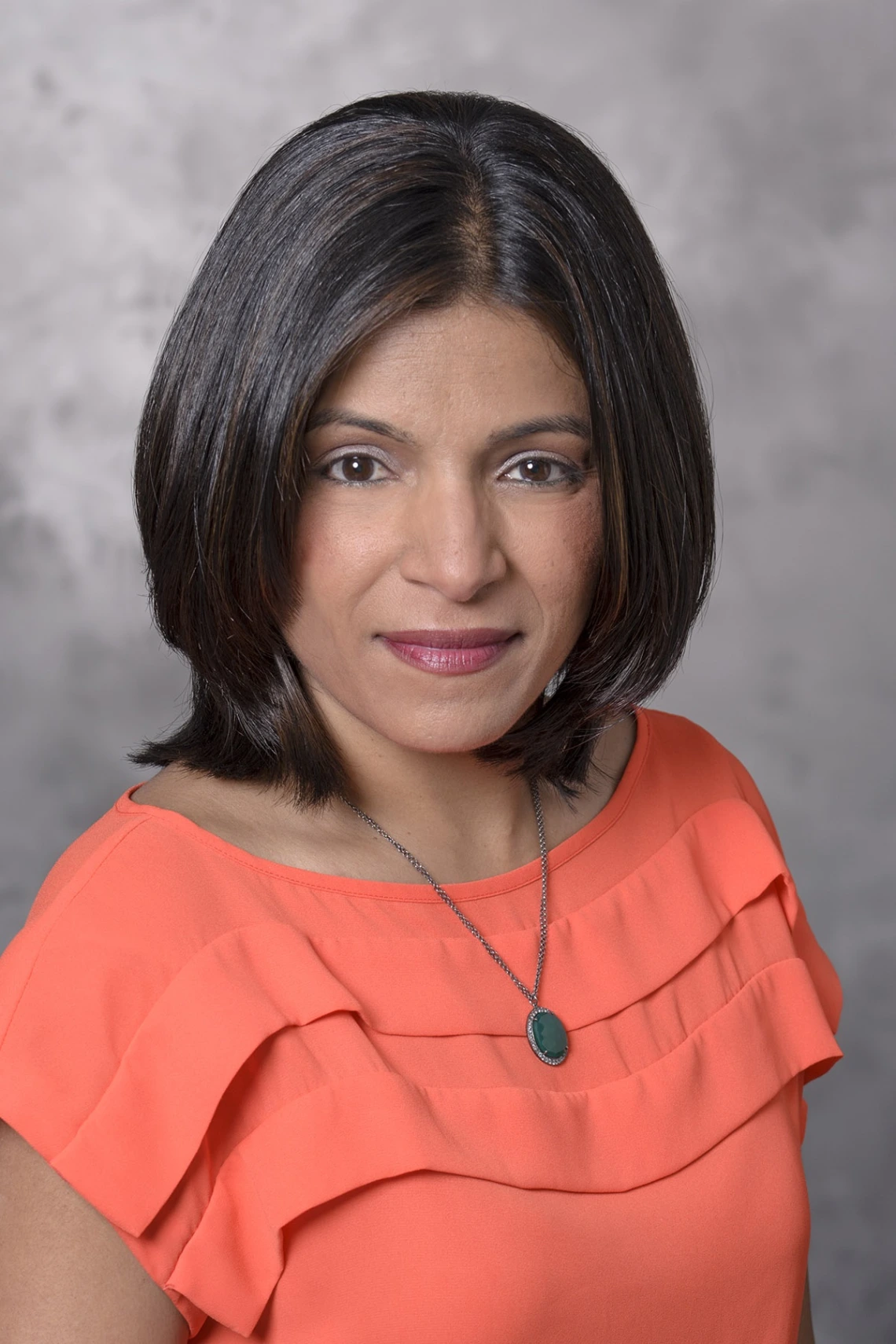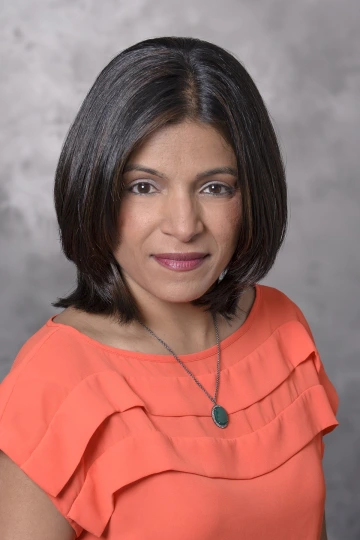Dr. Rachna Shroff Joins UA Cancer Center as Section Chief of Gastrointestinal Medical Oncology

Rachna Shroff, MD, describes her roots in Tucson and her vision for GI oncology within the UA Cancer Center and throughout the state.
Media Contact: Anna C. Christensen, 520-626-6401, achristensen@arizona.edu
May 15, 2018
TUCSON, Ariz. – Physician-scientist Rachna Shroff, MD, has joined the University of Arizona Cancer Center, where she

serves as the new section chief of gastrointestinal medical oncology, chair of the Data and Safety Monitoring Board (DSMB) and associate professor at the UA College of Medicine – Tucson.
A Tucson upbringing and East Coast education
Dr. Shroff, who specializes in cancers of the pancreas and biliary tract, comes to Arizona from Texas, where she was an associate professor at MD Anderson Cancer Center. But she is not new to the Copper State; Dr. Shroff grew up in Tucson and is a 1996 graduate of St. Gregory College Preparatory School, now known as the Gregory School.
“My parents worked hard to establish a successful life here,” Dr. Shroff said of her mother, a physician, and her father, a peptide chemist who worked alongside the UA Cancer Center’s Victor Hruby, PhD. “My younger sister and I had a nice upbringing. St. Gregory gave us a great launching pad for our subsequent educations, and Tucson was a great place for my parents to raise their kids.”
Dr. Shroff’s roots in Tucson also reach the UA Cancer Center, where as a high school student she worked with Margaret Briehl, PhD, professor of pathology at the UA College of Medicine – Tucson. Dr. Briehl remembers Dr. Shroff as enthusiastic and productive.
“Based on the potential that I saw, it is very fitting that she has become a successful physician-scientist,” Dr. Briehl said. “I’m delighted she has been recruited to the University of Arizona Cancer Center.”
The time Dr. Shroff spent at the UA Cancer Center as a teenager helped shape her path forward in life.
“I think the initial work I did in the Cancer Center is what prompted me to go into oncology,” Dr. Shroff said. “It’s pretty wonderful to come full circle.”
After high school, Dr. Shroff knew she wanted to pursue medicine, but also hoped to explore new places and perspectives. Her curiosity brought her to Brown University in Rhode Island, a school she chose in part for its liberal arts curriculum.
“I was looking for as well-rounded an education as possible,” Dr. Shroff recalled. “Brown gave me the opportunity to do a degree in biochemistry but also to take classes in classics, political science, art and architecture.”
Dr. Shroff received her medical degree from Thomas Jefferson University in Philadelphia, and did her clinical residency in internal medicine at Barnes-Jewish Hospital in St. Louis.
Plans for the future
Previously, Dr. Shroff spent more than a decade at MD Anderson Cancer Center, which she described as “a phenomenal place to be an oncologist and to do clinical research.”
Andrew Kraft, MD, UA Cancer Center director, and Julie Bauman, MD, MPH, division chief of hematology and oncology, lured Dr. Shroff back to Tucson after extending the opportunity to helm the UA College of Medicine – Tucson’s Section of GI Medical Oncology.
“Julie and Andrew really got my attention,” Dr. Shroff recalled. “They struck me as people who would inspire me to work harder and to improve myself. That is what gets me up every morning.”
Dr. Shroff is looking forward to strengthening the GI program with her colleagues.
“The three other GI oncologists here are fantastic,” said Dr. Shroff, referring to Emad Elquza, MD, Aaron Scott, MD, and Hani Babiker, MD. “It’s not me leading them, it’s the four of us sitting around a table and figuring out how we grow the program together. They are driven to move the needle forward for GI cancer. It’s a fantastic group to join.”
One of Dr. Shroff’s goals is to expand clinical trials, which give patients access to experimental drugs and advance medicine by identifying safer, more effective treatments. Dr. Shroff believes giving patients the option to participate in clinical trials is what sets excellent cancer centers apart from others.
“We are doing great with cancer therapy, but in GI cancer, there is so much more to be done,” said Dr. Shroff. “The only way to push that envelope is to try novel therapies and think outside the box. We must have a robust clinical trials portfolio, one that offers a clinical trial to any patient who walks through the door, for every GI malignancy.”
Dr. Shroff also hopes to enlist scientists in the clinical trial process to strengthen understanding of a drug’s effectiveness.
“The basic science is so rich at the University of Arizona,” Dr. Shroff said. “The only way to understand if a drug works, why it didn’t work, and how people become resistant to drugs, is to make clinical trials that are rich with correlative science. Clinicians need to work hand in hand with basic scientists.”
Dr. Shroff is also the new chair of the DSMB, which oversees patient safety and data quality for clinical trials spearheaded by UA Cancer Center investigators.
“I’m looking to grow the membership of the DSMB to have that cross-talk of ideas,” said Dr. Shroff. “I’m excited to sink my teeth into that.”
In addition to increasing collaboration within UA’s Tucson campus, Dr. Shroff hopes to build more connections with Phoenix. That vision includes developing a statewide GI cancer consortium to organize grants and clinical trials across all of Arizona.
Dr. Shroff sees her move to Tucson as the first step of an exciting journey — one that brings her 9-year-old daughter and 5-year-old son into closer contact with her parents, who still live here.
“We were very happy and comfortable in our life in Houston and I was hesitant to uproot everyone,” Dr. Shroff said. “It was my husband who said, ‘This will be a great adventure.’ Even forgetting about the job aspect, for the kids to be close to family is invaluable. I grew up with my grandparents living in Tucson, and it’s a priceless experience to have family around you.”
As an adult, Dr. Shroff has found a new appreciation for Tucson.
“Growing up here, I didn’t appreciate the beauty of the city because it was all I knew,” she recalled. “Now, as I’ve gotten older, I’ve really come to appreciate the beauty: the mountains, the stunning backdrops and the sunsets. It’s so peaceful and tranquil.”
Hopes for the future
Collaborating with colleagues and building the GI program are two important aspects of Dr. Shroff’s work, but her patients also keep her focused.
“I am motivated every morning to get to work and to take care of patients,” said Dr. Shroff. “Fighting with them, by their side, is incredibly important to me.”
After witnessing so many advances in cancer care this early in her career, Dr. Shroff is optimistic about the strides that will be made in the coming decades.
“It is a completely different ballgame than it was five years ago,” she said. “The rapidity with which it’s changing for the better gives you momentum, and inspires you to keep pushing. You can see progress on the horizon — it’s not a distant thought.”
While shorter-term goals for cancer care include increasing patients’ survival and quality of life, Dr. Shroff points to one aspiration that, if met, would represent a pinnacle in oncology.
“My hope would be to find a cure for each GI malignancy,” she said. “Nothing would make me happier than to be out of a job.”
About the University of Arizona Cancer Center
About the University of Arizona Cancer Center The University of Arizona Cancer Center is the only National Cancer Institute-designated Comprehensive Cancer Center with headquarters in Arizona. The UArizona Cancer Center is supported by NCI Cancer Center Support Grant No. CA023074. With its primary location at the University of Arizona in Tucson, the Cancer Center has more than a dozen research and education offices throughout the state, with more than 300 physicians and scientists working together to prevent and cure cancer. For more information: cancercenter.arizona.edu (Follow us: Facebook | Twitter | YouTube).



